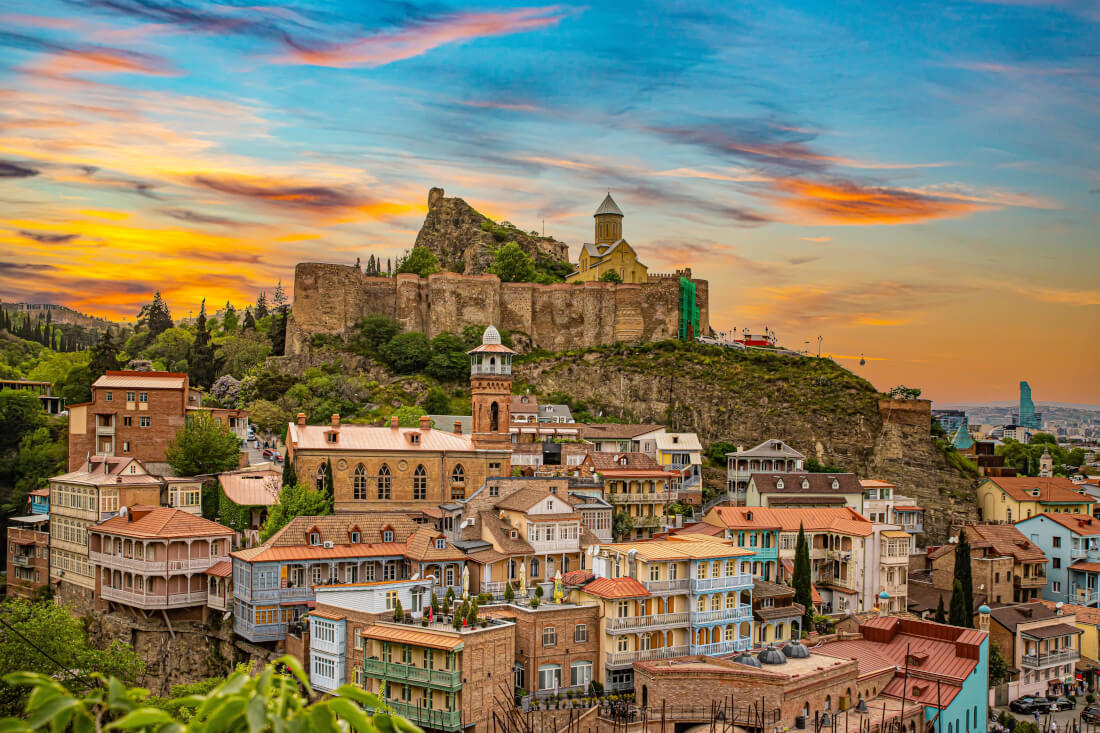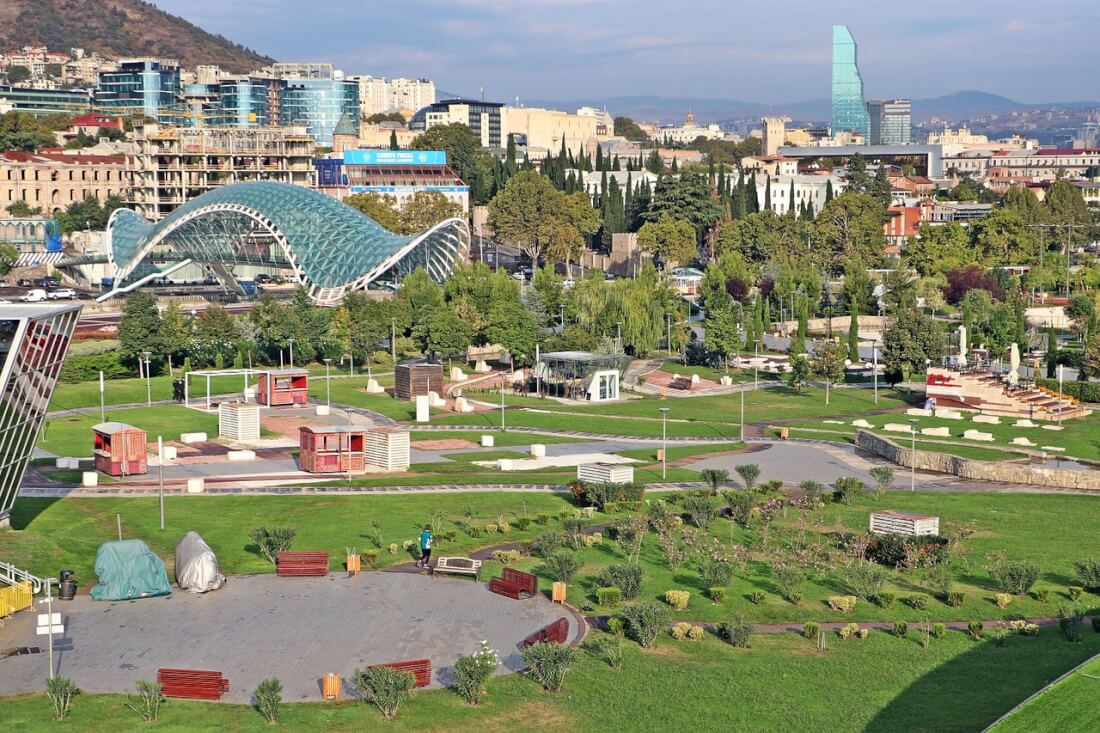Seasons in Tbilisi

Spring marks the beginning of warmer and more pleasant weather in Tbilisi, making it one of the best times to visit the Georgian capital. The city comes alive with blooming flowers, outdoor cafés, and cultural events. This season is characterized b...
Read more..
Summer brings hot and dry weather in Tbilisi, with long sunny days perfect for outdoor exploration and nightlife. This is peak tourist season, so the city feels vibrant and busy. However, the heat can be intense, so many travellers combine city exp...
Read more..
Autumn is often considered the best season for travel thanks to mild weather in Tbilisi and stunning fall colours. The city experiences comfortable temperatures and fewer crowds, making it perfect for cultural and outdoor activities.
-
<...

Winter brings cool and crisp weather in Tbilisi, with occasional light snowfall. While the city rarely experiences severe cold, the nearby Caucasus Mountains are perfect for skiing and snowboarding, making it a great time for winter sports enthusia...
Read more..Frequently Asked Questions (FAQs)
The best month to visit Tbilisi is May or September, when the city enjoys mild temperatures and fewer crowds. During these months, the weather in Tbilisi is pleasantly warm, perfect for exploring its charming old town, scenic viewpoints, and vibrant cafés. Spring brings blooming flowers and lush greenery, while autumn offers golden foliage and a cosy atmosphere. These periods are ideal for outdoor activities, walking tours, and day trips to nearby attractions. Additionally, flight and accommodation prices are often lower than in peak summer. For a balanced mix of comfort, culture, and natural beauty, late spring and early fall are ideal.
The coldest month in Tbilisi is January, when temperatures often range between 0°C and 6°C (32°F to 43°F). During this time, the weather in Tbilisi can be quite chilly, especially in the mornings and evenings, though heavy snowfall is rare in the city itself. Visitors can enjoy a quieter, less crowded atmosphere and explore cosy cafés, museums, and historic sites without the summer rush. Warm clothing is essential, and it’s a great time to experience Georgian winter traditions. Nearby mountain regions may have snow, making January ideal for day trips to ski resorts like Gudauri for winter sports enthusiasts.
When packing for Tbilisi, it’s best to plan according to the season. In spring and autumn, bring light layers, a jacket, and comfortable walking shoes. Summer can be hot, so pack breathable clothing, sunglasses, and a hat to stay cool. Winter requires warm coats, sweaters, scarves, and boots to keep comfortable in the cold. Since the weather in Tbilisi can change throughout the day, versatile layers are essential. Modest clothing is recommended when visiting religious sites, such as churches and monasteries. A small umbrella or light rain jacket can also be useful, especially during spring showers or unexpected autumn rain.
Spending three to four days in Tbilisi is ideal to experience the city’s rich culture, history, and food scene without rushing. This gives you enough time to explore the Old Town, Narikala Fortress, sulfur baths, local markets, and modern attractions like the Bridge of Peace. Depending on the weather in Tbilisi, you can enjoy walking tours, cable car rides, or outdoor cafés. A day trip to nearby places such as Mtskheta or the wine region of Kakheti can also fit comfortably into this schedule. With four days, you’ll get a balanced mix of sightseeing, relaxation, and authentic Georgian experiences.
When visiting Georgia’s capital, there are plenty of unique items to bring home to India. Popular souvenirs include Georgian wine, famous for its ancient winemaking traditions, and Churchkhela, a delicious local sweet made from nuts and grape juice. Traditional spices, honey, and herbal teas also make excellent gifts. Handmade crafts like woollen socks, felt products, and ceramics showcase local artistry. Depending on the weather in Tbilisi, you might also find beautiful scarves or traditional clothing. Don’t miss local skincare products made with natural ingredients like honey and herbs. These thoughtful items capture Georgia’s culture and make memorable gifts.
Tbilisi’s nightlife offers something for everyone, whether you enjoy lively bars, cosy cafés, or cultural experiences. After sunset, stroll along the illuminated Rustaveli Avenue or relax by the Mtkvari River. The city is known for its vibrant bar scene, featuring traditional Georgian wine bars and trendy clubs. You can also enjoy live music, from jazz to folk performances. If the weather in Tbilisi is cool, outdoor terraces and rooftop bars provide stunning views of the city lights. For a unique experience, visit a sulfur bathhouse open late for a relaxing soak. Nighttime in Tbilisi is perfect for soaking up its lively yet warm atmosphere.
During the summer months of June to August, Tbilisi experiences warm to hot temperatures, often ranging from 25°C to 35°C (77°F to 95°F). July and August are typically the hottest, with occasional heatwaves pushing temperatures above 35°C. The weather in Tbilisi during this period is mostly dry and sunny, making it ideal for exploring outdoor attractions and enjoying the city’s vibrant café culture. However, it’s important to stay hydrated and protect yourself from the strong sun by wearing light clothing, sunscreen, and a hat. Evenings tend to be cooler, offering pleasant conditions for nighttime strolls or dining outdoors.
Yes, it does snow in Tbilisi, but snowfall is usually light and infrequent. The weather in Tbilisi during winter can bring occasional snowstorms, typically between December and February, but heavy snow accumulation is rare within the city itself. Snowfall tends to melt quickly due to the city’s relatively mild winter temperatures. However, the nearby mountains see much more consistent and heavier snow, making them popular for winter sports. In Tbilisi, snow creates a charming atmosphere for a short period, but most winter days remain cold and cloudy rather than deeply snowy or icy.
Tbilisi experiences relatively low rainfall throughout the year, but the weather in Tbilisi shows slightly higher precipitation in late spring and early summer, particularly in May and June. These months can bring occasional showers and thunderstorms, which might disrupt outdoor plans. However, rainfall is generally short-lived and not heavy enough to significantly impact travel. The rest of the year, especially summer and autumn, tends to be drier and sunnier, making them more favourable for sightseeing and outdoor activities. If you want to avoid rain altogether, aim for late summer to early autumn when the weather is mostly dry and pleasant.
Visiting Tbilisi in the off-season, particularly winter, offers several travel benefits. Despite the colder weather in Tbilisi, the city is less crowded, allowing for a more relaxed and authentic experience. Accommodation and flight prices are typically lower, making it budget-friendly. Winter also highlights Tbilisi’s cosy cafés, warm hospitality, and festive atmosphere during holidays. While the snow is light, nearby mountains provide excellent skiing opportunities. Museums, galleries, and bathhouses offer warm indoor activities. If you prefer quieter streets and a slower pace, winter is a great time to explore Tbilisi’s rich culture without the summer tourist rush.
During summer, Tbilisi’s warm weather makes outdoor sights and activities especially enjoyable. Explore the historic Old Town on foot, visit Narikala Fortress for panoramic city views, or stroll along the scenic Mtkvari River. Parks like Rike Park and Vake Park are perfect for picnics and relaxing under the sun. Take a cable car ride for stunning vistas or visit the Botanical Garden for nature lovers. Outdoor cafés and rooftop bars offer great spots to unwind. For adventure, nearby hiking trails and day trips to the wine region of Kakheti provide memorable summer experiences in and around Tbilisi.
Yes, Tbilisi hosts several major festivals tied to specific seasons, offering great reasons to plan your visit. In spring, the Tbilisi Open Air Music Festival attracts international artists and lively crowds. Summer features the Tbilisi International Film Festival, showcasing diverse cinema. Autumn brings the Tbilisi Jazz Festival and the Rtveli grape harvest celebrations, perfect for wine lovers. Winter hosts New Year and Christmas festivities with vibrant markets and events. The weather in Tbilisi during these seasons influences festival experiences, from warm outdoor concerts in summer to cosy indoor events in winter. Planning around these festivals lets you enjoy the city’s rich culture and vibrant atmosphere.



















